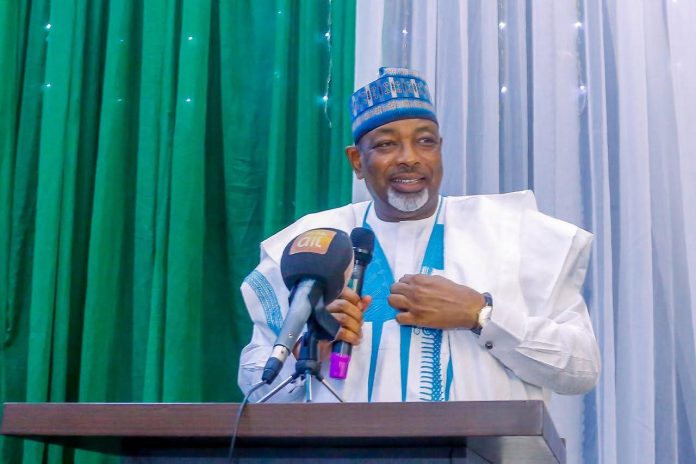President Bola Ahmed Tinubu has launched the Global Flood Disaster Management Project (GFDMP), a multi-year climate resilience initiative aimed at reducing Nigeria’s vulnerability to severe flooding and safeguarding the nation’s agricultural backbone.
The President, represented by the Minister of Agriculture and Food Security, Sen. Abubakar Kyari, unveiled the project on Tuesday, November 25, 2025, in Abuja.
Read Also: Tinubu’s agricultural reforms driving decline in food prices in Nigeria – Agric Minister
He said the initiative marks a decisive shift from Nigeria’s long-standing reactive flood response system to a proactive, preventive, and technology-driven model.
President Tinubu emphasized that the impact of climate change is persistent, far-reaching, and demands long-term planning.
“Resilience is not built in a moment, but through consistent investment, planning, monitoring, and innovation over time,” he said.
He noted that recurring floods continue to devastate farmlands, displace families, and cripple essential infrastructure across the country—making flood preparedness not just an environmental concern, but a national priority.
The President outlined the four core pillars that will drive the GFDMP: Advanced early warning systems, flood-resilient infrastructure, capacity building aknowledge transferfer and community engagement and local participation.
According to him, the programme will enhance Nigeria’s forecasting capacity, introduce real-time monitoring tools, and deploy digital alert systems to give citizens and government agencies more time to prepare and respond effectively.
“Flood resilience is not a luxury; it is a necessity. It is a responsibility we owe to our citizens today and to our children tomorrow,” the President stated.
With agriculture accounting for a significant share of Nigeria’s economy and livelihoods, the President stressed that enhanced climate preparedness would particularly benefit rural farming communities.
He explained that the GFDMP integrates hydrological data, community-based risk mapping, and modern climate tools to help farmers anticipate seasonal changes, protect croplands, and reduce post-disaster losses.
“The federal government views this project as a major step in tackling climate-related disasters that ravage farmlands,” Tinubu said.
“Nigeria is proud to be part of this global movement.”
President Tinubu noted that the country has already prioritized early warning systems, updated hydrological infrastructure, environmental protection, and efficient disaster-response coordination.
The GFDMP, he added, will strengthen and accelerate these national priorities through global expertise, international collaboration, and cutting-edge technology.
“Let today mark the beginning of a new era—one in which nations no longer face floods with fear, but with preparation; no longer with vulnerability, but with resilience.”
He pledged the government’s “full cooperation, active participation, and unwavering commitment” toward ensuring that the programme reaches every community that needs it.
In his welcome address, the Director General of the Nigeria Hydrological Services Agency (NIHSA), Mr. Umar Mohammed, highlighted the human toll of Nigeria’s escalating flood risk.
“These figures represent real families whose livelihoods have been disrupted,” he said.
“Proactive preparedness is far cheaper than emergency response.”
He noted that with Nigeria experiencing more frequent and intense flooding triggered by climate change, a coordinated multi-sectoral approach—such as the GFDMP—has become essential for national security and sustainable development.



